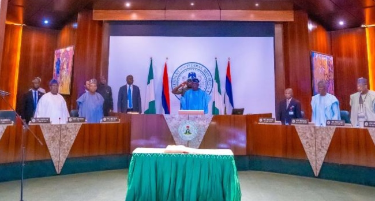The Federal Executive Council (FEC) has temporarily paused its consideration and deliberation on the memo concerning the new minimum wage. This decision was made to allow President Bola Tinubu additional time to consult more extensively with various stakeholders. This development was disclosed by the Minister of Information and National Orientation, Mohammed Idris, during a briefing with State House correspondents on Tuesday, where he discussed the outcomes of the council meeting.
Minister Idris explained that while the President has reviewed the report submitted by the Tripartite Committee on Minimum Wage, further consultation is necessary before a final submission on a new national minimum wage can be made to the National Assembly. “I want to inform Nigerians here that the Federal Executive Council deliberated on that [the report of the tripartite committee on the new national minimum wage],” Idris stated.
He elaborated that the issue of a new national minimum wage is not solely a federal matter. “The decision is that because the new national minimum wage is not just that of the Federal Government. It is an issue that involves the Federal Government, the state governments, local governments, the organised private sector, and of course, including the organised labour. That memo was stepped down to enable Mr. President to consult further, especially with the state governors and the organised private sector, before he makes a presentation [of an executive bill] to the National Assembly,” Idris added.
 The discussions for a new minimum wage for Nigerian workers have been ongoing for some time. The Minimum Wage Act of 2019, which set the minimum wage at ₦30,000, expired in April 2024. This Act is due for review every five years to align with the current economic realities faced by workers.
The discussions for a new minimum wage for Nigerian workers have been ongoing for some time. The Minimum Wage Act of 2019, which set the minimum wage at ₦30,000, expired in April 2024. This Act is due for review every five years to align with the current economic realities faced by workers.
In January, President Bola Tinubu established a Tripartite Committee to negotiate a new minimum wage. This committee included representatives from the Organized Labour, federal and state governments, and the Organized Private Sector. However, the committee struggled to reach a consensus on a new realistic minimum wage, prompting labour unions to launch an indefinite strike on June 3, 2024. The strike caused widespread disruptions as labour shut down critical infrastructure including airports, hospitals, the national grid, banks, and legislative complexes.
Labour unions argued that the current minimum wage of ₦30,000 was insufficient to meet the basic needs of an average Nigerian worker. They emphasized the need for a wage adjustment that reflects the current inflationary pressures and the economic impacts of recent government policies, such as the removal of the petrol subsidy and the unification of the forex windows.
Following assurances from President Tinubu that he was committed to a wage increase above ₦60,000, the labour unions “relaxed” their strike on June 4, 2024. Subsequent negotiations between the Trade Union Congress (TUC), Nigeria Labour Congress (NLC), and representatives from the Federal Government, states, and the Organized Private Sector continued. However, by June 7, 2024, both sides were still at an impasse. Labour reduced their demand from ₦494,000 to ₦250,000, while the government increased its offer from ₦60,000 to ₦62,000.
Both sides submitted their reports to the President, who is now tasked with making a final decision. He is expected to send an executive bill to the National Assembly for the passage of a new minimum wage law. In his Democracy Day speech on June 12, 2024, President Tinubu reassured the Organized Labour that an executive bill for the new national minimum wage would soon be forwarded to the National Assembly.
The President is now faced with the challenge of balancing the ₦62,000 proposal from the government and private sector with the ₦250,000 demand from the Organized Labour. His decision will significantly impact the economic well-being of Nigerian workers and the broader economy.
As the nation awaits the President’s final decision, it is clear that this issue is not just about numbers, but about addressing the fundamental economic challenges facing Nigerian workers. The outcome of these consultations and the eventual new minimum wage will be a critical milestone in the ongoing efforts to improve the living standards of workers in Nigeria.




